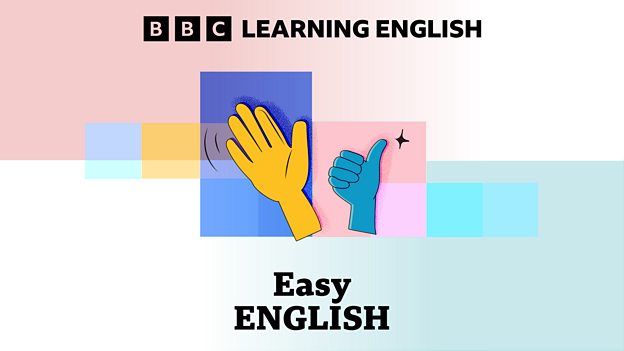6 Minute English
Intermediate level
A vaccine for cancer
Episode 250227 / 27 Feb 2025

_____________________________________________________________________________________________________
Download a free 6 Minute English worksheet and transcript!
Try our free interactive quiz!
______________________________________________________________________________________________________
Try more episodes of 6 Minute English:
______________________________________________________________________________________________________
Introduction
Could a cancer vaccine soon be a reality? Beth and Neil discuss this and teach you some new vocabulary.
This week's question
Which disease did the first successful vaccine treat?
a) flu
b) polio, or
c) smallpox
Listen to the programme to hear the answer.
Vocabulary
breakthrough
sudden, dramatic and important discovery
a number of (something)
several or many; used to add credibility to what you are saying
Nothing to see here!
used to encourage people to move or look away from something, or to stop them from paying it much attention
hijack
take control of something that does not belong to you for your own advantage
blind to (something)
completely fail to notice or realise the threat of something
re-educate
teach somebody to think or behave in a new or different way
TRANSCRIPT
Note: This is not a word-for-word transcript.
Neil
Hello. This is 6 Minute English from BBC Learning English. I’m Neil.
Beth
And I’m Beth. In our lifetime, 1 in 5 people will be affected by cancer, a disease where cells grow uncontrollably and cause tumours in the body. Tumours can be benign, meaning not cancerous, or malignant, meaning cancerous, and in 2022 there were an estimated 9.7 million deaths from malignant cancers worldwide. But in this programme, we’ll be focusing on some good news instead.
Neil
Vaccines are medicine which protect the human body by making it immune from a certain disease. Now, there’s been a sudden and important discovery – a breakthrough - in the development of a new vaccine called mRNA.
Beth
So, could a vaccine for cancer soon become a reality? That’s what we’ll be finding out, as well as learning some useful new words and phrases. And remember, if you like listening to 6 Minute English and want to read along at the same time, you can find a transcript for the programme on our website, bbclearningenglish.com.
Neil
Now I have a question for you, Beth. We’ve mentioned some of the most recent vaccines, but which disease did the first successful vaccine treat? Was it:
a) flu?
b) polio? or
c) smallpox?
Beth
I’m going to say polio.
Neil
OK! Well, we’ll find out the correct answer at the end of the programme. You might wonder why the body’s immune system doesn’t fight cancer automatically. The reason is that cancer has clever ways of hiding from our natural defences, as Dr Meredith McKean, director of research at Tennessee Oncology, explained to BBC World Service programme, The Inquiry:
Dr Meredith McKean
There's been a number of studies that have demonstrated the different techniques that the cancer has developed to be able to put up signals or proteins, essentially, on the surface of the cancer cells, to tell the immune system, ‘Go away! There's nothing here to look at!’ And so it's actually been hijacking these receptors to essentially tell the immune system to kind of take the brakes off, and be more aggressive in fighting cancer. That's really allowed a breakthrough with immune therapy over the past decade.
Beth
Dr McKean says that a number of studies have demonstrated how cancer spreads. She uses the phrase a number of to mean several, but it also makes her statement more convincing, because of course several studies are better than just one.
Neil
Cancer cells switch off the immune system by pretending to be healthy cells. It’s like they’re saying Nothing to see here! – an informal phrase which can be used to encourage people to move or look away from something, either in a playful way, or to cover something up. For example, a police officer at a crime scene might say, “Nothing to see here!” to move people on.
Beth
So, in other words, cancer hijacks healthy cells – it takes control of something which doesn’t belong to it and uses it for its own advantage.
Neil
So, how would a vaccine change things? Well, existing treatments, like chemotherapy, aggressively target the cancer, but also attack healthy tissue, creating unpleasant side effects. New breakthrough vaccines, on the other hand, retrain the immune system to recognise cancer cells and eliminate those, and only those, naturally – even in patients with the disease already. Here’s, Professor Eduardo Sanchez, of the Anderson Cancer Center in Texas, explaining more to BBC World Service’s, The Inquiry:
Prof Eduardo Sanchez
Basically the cancer cells are telling the immune system, ‘Don't attack me, don't eat me’, right? The immune system has forgotten how to go about recognising those cancer cells, becoming blind to recognise those aberrations that cancer cells generate, and what we want to do with vaccines is to re-educate the immune system.
Beth
In cancer patients, the immune system is blind to cancerous growths – it completely fails to notice them or be aware of their danger, so the vaccine re-educates the immune system, or teaches it to behave, in a different way.
Neil
To recap, some cancer treatments work by unblocking our blocked natural defences, whereas vaccines retrain the immune system to find and attack cancer cells naturally. Because these two approaches are quite different, they can be used together and individually.
Beth
So, to answer my original question, Neil, a vaccine for cancer might not be too far away. But how about your question – isn’t it time you revealed the answer?
Neil
I asked which disease was first successfully treated by a vaccine?
Beth
And I said polio. Was I right?
Neil
You were wrong, I'm afraid. The correct option was C, which is smallpox. OK, let's recap the vocabulary we've learned in this programme, starting with breakthrough, a sudden, dramatic and important discovery.
Beth
A number of something means several, or many, and can add credibility to what you say.
Neil
The phrase, Nothing to see here! is used to discourage people from paying attention or looking too closely at something, or to move them away.
Beth
If you hijack something, you use something that does not belong to you for your own benefit.
Neil
Being blind to something means failing to notice it or recognise it as a threat.
Beth
And finally, to re-educate means to teach somebody to think or behave in a new or different way. Once again our six minutes are up, but if you’re hungry for more, head over to our website, bbclearningenglish.com, where you can find the worksheet for this programme, as well as a quiz. Good luck and we’ll see you again soon. Bye for now!
Neil
Bye!
Latest 6 Minute English

How can we help wild bees?
Episode 250717 / 17 Jul 2025
Did you know that many species of wild bees are endangered in the UK? What can we do to help?

Do you need to declutter your home?
Episode 250710 / 10 Jul 2025
Is your home neat and tidy? Or is it full of stuff you no longer need? You might need to declutter!

How do you say sorry?
Episode 250703 / 03 Jul 2025
Different cultures apologise in different ways. How do people say sorry where you are from?

Are plant-based substitutes healthier than meat?
Episode 250626 / 26 Jun 2025
Processed meat has been shown to be bad for our health, but are plant-based meat substitutes any healthier?

How do babies communicate?
Episode 250619 / 19 Jun 2025
What does it mean when newborn babies wave their arms and legs about?

Can climate change affect our mental health?
Episode 250612 / 12 Jun 2025
Is your mental health being affected by climate change?

How important is politeness?
Episode 250605 / 05 Jun 2025
How would you greet somebody you didn't know?

What's your favourite kind of noodle?
Episode 250529 / 29 May 2025
How much do you know about noodles?


Which cooking oil is the best?
Episode 250515 / 15 May 2025
Are some cooking oils better for your health than others?

Should animals be kept in zoos?
Episode 250508 / 08 May 2025
Are zoos an important scientific resource, or an unnecessary abuse of animal rights?

Can cows prevent wildfires?
Episode 250501 / 01 May 2025
How are cows helping to prevent wildfires in Spain?

How climate change affects animal migration
Episode 250424 / 24 Apr 2025
How is climate change affecting animal migration?

Can AI solve crime?
Episode 250417 / 17 Apr 2025
Could artificial intelligence be used to solve a murder?


Are we getting more allergic to things?
Episode 250403 / 03 Apr 2025
Do you know anyone who has 50+ allergies?

Can we boost the immune system?
Episode 250327 / 27 Mar 2025
Can ginger shots, turmeric and cold water swimming boost your immune system?


Should we eat less rice?
Episode 250313 / 13 Mar 2025
Is it possible to grow rice in a more eco-friendly way?



Young women on social media
Episode 250220 / 20 Feb 2025
How do women in different countries experience the online world?

Rage bait: How online anger makes money
Episode 250213 / 13 Feb 2025
How do people make money from rage bait?



How the world learned to love fast food
Episode 250123 / 23 Jan 2025
How did fast food spread around the world?

Which country has the best schools?
Episode 250116 / 16 Jan 2025
How do you compare education systems?

Eating 50-year-old stew
Episode 250109 / 09 Jan 2025
Would you eat a stew that's been in a pot for 50 years?

Are you drinking enough water?
Episode 250102 / 02 Jan 2025
How much water do you drink every day? Is it enough?







